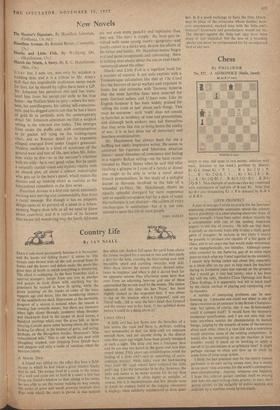New Novels
The Doctor's Signature. By Hamilton Johnston. (Gollancz, 13s. bd.) Hamilton Avenue. By Ronald Byron. (Constable, 15s.) Sharks and Little Fish. By WcIfgang Ott. (Hutchinson, 15s.) March the Ninth,. A Story. By R. C. Hutchinson. ( Bles, 15s.) Lucky JIM, I now see, was only by accident a budding don, and it is a tribute to Mr. Amis's skill that this improbable profession seems made for him, for he should by rights have been a GP. Mr. Johnston has perceived this and has trans- lated him from his peripheral exile to his true home—the Welfare State sit; gery—where his new- ness, his unwillingness, his jutting self-conscious- ness, and his dogged conviczion that he has a heart of gold fit in perfectly with the contemporary detail. Mr. Johnston convinces me that a surgical setting is the relevant one today. This emerges from under the duffle coat with contraceptives in its pocket left lying on the waiting-room chair, just as Russian detail (so its exponents alleged) emerged from under Gogol's greatcoat. Modern medicine is a kind of syndrome of the general wear and tear of life, and when Mr. John- ston sticks to this—as in the narrator's relations With his wife—he is very good value. But he spoils a naturally candid vision and stylistic vitality with an absurd plot, all about a sinister industrialist Who gets on to the hero's panel, which makes the doctors end up looking about as realistic as the knockabout comedians in the film series.
Hamilton Avenue is a first-rate novel, extremely exciting and moving and commendably free from a racial message. But though it has no palpable design upon us its portrait of a street in a Johan- nesburg Negro slum tells us all we need to know about apartheid, and it is typical of its fairness that we are left wondering why the South Africans
are not even more panicky and repressive than they are. The story is simple : the hero gets in- volved with some young istxtvis—gangsters—and finally comes to a sticky end, despite the efforts of his father and family. Mr. Hamilton makes Negro evil and good recognisable and convincing: there is nothing over-exotic about the one or coal-black- mammyish about the other.
Sharks and Little Fish is a repellent book for a number of reasons. It not only exploits with a Tussaudesque calculation like that of The Cruel Sea the horrors of naval warfare and exposure in boats, but also intimates with Teutonic hysteria that the most horrible fates were reserved for poor German sailors and U-boat men. Like its English forebear it has been widely praised for 'telling the truth at last' about such things. This must be nonsense : such 'truth' does not consist in facts 'but in stridency of tone and presentation, and although both authors may kid themselves that they write like this to bring home the reality of war, it is in fact done out of mercenary and heartless sensationalism.
Mr.. Hutchinson has always been for me a baffling but oddly impressive writer: He seems to construct his rigorous and laborious situation pieces—queer dilemmas of conscience and feeling in a vaguely Balkan setting—on the basis recom- mended by Henry James when he said that after catching a glimpse in Lyons of a family at dinner one ought to be able to write a novel about French protestantism. In this study of a polyglot doctor in Slovenia involved in the fate of a wounded ex-Nazi, Mr. Hutchinson shows an equally splendid disregard for mere experience and an equally scrupulous feel for a state of mind. His technique is not abstract—the calibre of every machine-gun is mentioned—but it is too con- sidered to seem like life to most people.
JOIN BAYLEY


































 Previous page
Previous page